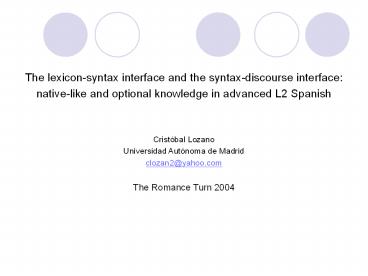The lexicon-syntax interface and the syntax-discourse interface: - PowerPoint PPT Presentation
Title:
The lexicon-syntax interface and the syntax-discourse interface:
Description:
The lexicon-syntax interface and the syntax-discourse interface: native-like and optional knowledge in advanced L2 Spanish Crist bal Lozano Universidad Aut noma de ... – PowerPoint PPT presentation
Number of Views:181
Avg rating:3.0/5.0
Title: The lexicon-syntax interface and the syntax-discourse interface:
1
- The lexicon-syntax interface and the
syntax-discourse interface - native-like and optional knowledge in advanced L2
Spanish - Cristóbal Lozano
- Universidad Autónoma de Madrid
- clozan2_at_yahoo.com
- The Romance Turn 2004
2
Background
- Emerging pattern in advanced L2 acquisition of
syntactic properties vs. discursive props.
- converge with formal/syntactic props
- ? native-like knowledge.
- diverge with discursive props like topic and
focus (syntax-discourse interface) - ? divergent / optional knowledge.
3
Aim
- If emerging view is correct, will it be observed
with the second property of pro-drop parameter
subject inversion? - Subject inversion is constrained
- Syntactically (Unaccusative Hypothesis) at
lexicon-syntax interface - Discursively (TP-internal presentational Focus
Phrase) at syntax-discourse interface
4
SV/VS alternations
- Subtle learnability problem for learners of L2
Spanish - Do SV / VS alternate freely?
- (1) María gritó (SV) / Gritó María (VS)
- Maria shouted Shouted Maria
- (2) María llegó (SV) / Llegó María (VS)
- Maria arrived Arrived Maria
- Alternations constrained formally (Unaccusative
Hypothesis) and discursively (presentational
focus).
5
Syntax Unaccusative Hypothesis
Principle of UG UTAH Parameter pro in
Spec,TP
Greek like Spa. English strictly SV (no surface
syntactic effects)
6
Syntax-discourse presentational focus
Greek Eng pres focus in situ SV (pres. focus
subject checked in Spec,TP)
7
Summary of word order
Unfocused contexts
Focused contexts
What happened?
Who shouted/arrived?
Unergatives
SV
VS
María gritó
Gritó MaríaFoc
Maria
shouted
Shouted Maria
Unaccusatives
VS
VS
Llegó
María
Llegó
MaríaFoc
Arrived Maria
Arrived Maria
8
Previous L2 findings
- Syntax (Unacc. Hypothesis)
- English-speaking learners of Spanish are
sensitive to the syntactic effects of the Unacc.
Hypothesis from early stages of development SV
with unergatives but VS with unaccusatives - (De Miguel, 1993 Hertel, 2000, 2003 Hertel
Pérez-Leroux, 1999). - Discourse under-researched area
- Hertel (2003) presentationally focused subjects
in final position are acquired late in L2 Spa.
Same finding for L2 Italian (Belletti Leonini,
2004). - Ocampo (1990) and Camacho (1999) L2 Spa
acquisition of distinct word orders to mark focus
is acquired late or perhaps never acquired in
native-like fashion.
9
Method
- Instrument
- Contextualised acceptability judgement test
(Hertel, 2000)
Translation
10
Results unfocused contexts(Unaccusative
Hypothesis)
- Qué pasó? What happened?
- Unergatives (SV) Unaccusatives (VS)
sig
sig
sig
sig
sig
sig
Convergence with natives (native-like knowledge)
11
Results focused contexts(Presentational focus
at syntax-discourse interface)
- Quién gritó / llegó? Who shouted / arrived?
- Unergatives (VS) Unaccusatives (VS)
sig
sig
n.s.
n.s.
n.s.
n.s. (just)
Divergence with natives (subtype optionality)
12
Conclusion
- ? Sorace (2000c 2004), Tsimpli et al (in press),
Tsimpli (2001) - -interpretable vs. interpretable features
Highly vulnerable to attrition
Less vulnerable to attrition
Convergent (native-like)
Divergent (e.g., optionality)
Uninterpretable D and phi features on T
licensing postverbal subjects at syntax
Interpretable Focus feature at syntax-discourse
syntax
discourse
13
- Thank you !
14
(No Transcript)
15
Native non-native Native non-native































